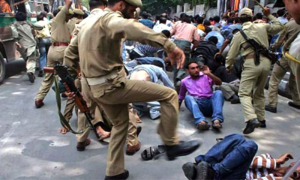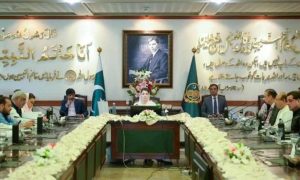As the people of Pakistan have been celebrating the historic triumph of 1965 war in the month of September, it is unfortunate that India, on the other hand, out of utter desperation, is once again churning out disinformation and propaganda against Pakistan, particularly with a focus on the current situation in Gilgit Baltistan.
The region is of stunning natural beauty and immense cultural diversity. Of late, the GB region is once again in the grip of sectarian tensions, which, in fact, have deep historical roots, often exacerbated by external influences. The region encompasses a diverse array of sects, with the Sunni and Shia communities constituting the two predominant identities. One of the most potent weapons in India’s arsenal has been the manipulation of sectarian divides. And over the years, it regrettably has only tried to fuel sectarian divisions through different tactics including through financial support and propaganda machine. India’s covert support for sectarian elements within Gilgit-Baltistan has fueled tensions and violence, all in an effort to weaken Pakistan.
The Indian media has been instrumental in exploiting the current situation in Gilgit-Baltistan by portraying Pakistan as an aggressor and oppressor in the region. It is crucial to remember that the region’s accession to Pakistan was the result of a popular vote by its residents, reflecting their genuine desire to be part of Pakistan. Over the years, successive governments in Pakistan also made genuine efforts to address the legitimate concerns of the people of Gilgit-Baltistan by taking steps towards empowering the local populace and addressing their socio-economic needs.
Substantial investments have also been made in the region’s infrastructure, creating numerous opportunities for the people of Gilgit-Baltistan. The China-Pakistan Economic Corridor (CPEC) has further enhanced the region’s significance due to its proximity to China. However, India’s rhetoric continues to paint Pakistan as an occupier, blurring the lines between fact and fiction, with the clear objective of fomenting unrest, undermining Pakistan’s position in the region, and perpetuating instability.
It is essential to recognize that India’s propaganda primarily serves its own interests, often as a diversionary tactic to shift attention away from the situation in the illegally-occupied Jammu and Kashmir. Several international human rights organizations including Amnesty International have recently written an open letter to the G-20 countries, calling for an end to human rights violations in Indian illegally-occupied Jammu and Kashmir and release of jailed human rights defenders and political prisoners.
This letter paints a gloomy picture of the occupied valley, saying the Indian security forces have intensified their crackdown on independent media and civil society groups including through the frequent use of abusive counterterrorism and state security laws, including the Unlawful Activities Prevention Act and Jammu and Kashmir Public Safety Act. These laws violate international norms and are systematically used by Indian authorities to incapacitate and persecute human rights defenders and dissenters.
Journalists in the IIOJK face extreme levels of harassment by security forces, including interrogation, raids, threats, physical assault, restrictions on freedom of movement, and prosecutions under counter-terror laws for their reporting. This is in sharp contrast to the situation in Gilgit-Baltistan where the journalists are free to report and there is no ban on freedom of expression. While Gilgit-Baltistan benefits from an environment that allows the press to fulfill its vital role in informing the public, the IIOJK struggles with a climate of intimidation and censorship that hinders the free flow of information.
Whilst it is for the international community to take notice of the bleak human rights situation in IIOJK, it is also for our authorities concerned to nab the foreign-backed elements trying to fan sectarian strife in Gilgit-Baltistan. Leaving this matter unaddressed can have dire consequences and spillover effect. Our religious scholars from all schools of thought should sit together and foster the message of harmony and peaceful coexistence to thwart the sordid designs of the enemy.























